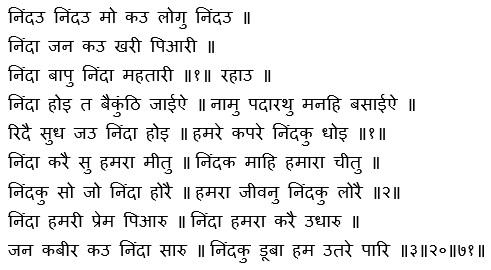Apr 25, 2025
Apr 25, 2025

Transliteration
Ni(n)dhau ni(n)dhau mo kau loag ni(n)dhau.
Ni(n)dhaa jan kau kharee piaaree.
Ni(n)dhaa baap Ni(n)dhaa mahataaree. 1. Rahaau.
Ni(n)dhaa hoi ta baiku(n)Th jaieeaai. Naam padhaarath muneh basaieeaai.
Ridhai sudh jau ni(n)dhaa hoi. Hamare kapare ni(n)dhak dhoi. 1.
Ni(n)dhaa karai su hamaraa meet. Ni(n)dhak maeh hamaaraa cheet.
Ni(n)dhak so jo ni(n)dhaa horai. Hamaraa jeevan ni(n)dhak lorai. 2.
Ni(n)dhaa hamaree prem piaar. Ni(n)dhaa hamaraa karai udhaar.
Jan Kabir kau ni(n)dhaa saar. Ni(n)dhak ddoobaa hum utare paar. 3.20.71.
– (SGGS, Pg. No. 339)
Translation:
Slander Me! Slander Me! Go ahead folks and slander me.
Slander is pleasing to the Lord's humble servant.
Slander is my father; slander is my mother. 1. Pause.
If I am slandered, I go to Vaikunth (heaven).
The wealth of the Naam, the Name of the Lord, abides within my mind.
When I am slandered my heart is purified,
As the slanderer has washed my clothes clean. 1.
One who slanders me is my friend.
My heart goes out to my slanderer.
The one who stops pointing out my faults is actually my detractor.
(Really) The slanderer wishes me a long/better life. ||2||
I have love and affection for the slanderer.
Slander is my salvation.
Slander is the best thing for servant Kabir.
The slanderer gets drowned, while I am carried across. 3.20.71.
Explanation
Here, we see a behavior contrary to a normal human reaction. Instead of being critical of his slanderers, Kabir Ji is applauding them. He says, “Slander Me! Slander Me! Go ahead folks and slander me”. This sounds like a dichotomy because no one likes to be slandered. Normally the person getting slandered will be after the slanderer’s neck. But Kabir Ji is saying that the slanderer is dear and pleasing to the devotee - Kabir.
How come Kabir Ji has chosen a different route by applauding the slanderer?
The mystery is solved by Kabir in the next line by declaring that slanderer is like my mother and my father, as he is my well-wisher. Just as the parents criticize or reprimand only for the betterment of the child, he is doing the same. The parents wish to see their child become successful in life, so they criticize the child to become a better person, a kind, and a compassionate being. Their criticism is not aimed at putting down the child, but to gently encourage the child in inculcating the virtues.
Kabir sees the slanderer in the same light, as they help him with his growth by pointing out the areas where he can grow. No wonder, Kabir Ji puts the slanderer on a high platform as he sees their valuable contributions in his inner development. He says because of the slanderer “I go to heaven.” With the slanderer pointing out his vices, he initiated a corrective action, thus ridding self of them. The role that the slanderer has played in his growth is that of a launderer, who has washed the dirt of his soiled cloth – the mind. When the mother washes the child’s soiled clothes, they become clean, same way the fabric of his mind has been cleansed by the slanderer making it pristine like laundered clothes, free from spots and stains.
Another way of looking at it will be that when the world becomes critical of the devotee it is attempting to put the devotee down. Kabir Ji is appreciative of the slanderer and considers his nemesis to be his well-wisher, helping him in crossing the worldly ocean, while slanderer himself gets drowned in it. By attempting to denigrate the devotee has helped him by freeing him to devote his time and energy in remembrance of “Naam” – Divine Consciousness, Creative Power, Intelligence and Wisdom. It is from this perspective alone that Kabir labels the slanderer as his parent, friend, and a well-wisher. He says that slanderer has contributed positively by helping him in ridding him of his vices, thus helping him to make his life virtuous. He says that slanderer’s words are very dear to me and “I listen very carefully to him” to set the corrective action plan. He considers one who chooses not to point out my flaws as his detractor, as he does not wish me to get rid of them.
Kabir is sharing the roadmap that puts the devotee on the path of spiritual progress. Kabir Ji has benefited from the slanderer’s criticism as it paved way for him on his spiritual growth. The poem is a perfect satiric ‘ode’ to slander, hurled to defame has been turned into a source of spiritual growth by the devotee. The strong opening lines along with strong conclusion is an embrace to role of the slanderer. Kabir Ji shares the idea that those embarking on the spiritual journey must be willingly ready for criticism, defamation, and social ostracism. A devotee ostracized by society attained salvation, while slanderer drowned themselves. The devotee did not just complete life’s journey successfully, he also rejected the world.
April 1, 2023
References:
1. Singh, Bhai Vir. Santhiya Sri Guru Granth Sahib, Volume 5. Bhai Vir Singh Sahitya Sadan, New Delhi
2. Singh, Prof. Sahib. Sri Guru Granth Sahib Darpan, Volume 2. Raj Publishers, Jalandhar
3. Dharwadker, Vinay. Kabir: The Weaver’s Song. Penguin Books India Pvt. Ltd.

|
Bhupinder jee Another great article . Just like Kabir jee your perspective is unique. In my opinion the slanderer does mot deserve the appreciation since the slanderer is not truthful and critiques without any base or benefit. It’s different from criticism coming from the parents. Kabir in the end does acknowledge that the slanderer will be drowned , |

|
Very thoughtful and insightful articulation. May Waheguruji bless us all with the wisdom of Kabir ji. May Almighty grant his grace on all of us. |

|
What a thought? Unbelievable, praising and appreciating the slanderer (criticizer) as one who wants to help you improve. |